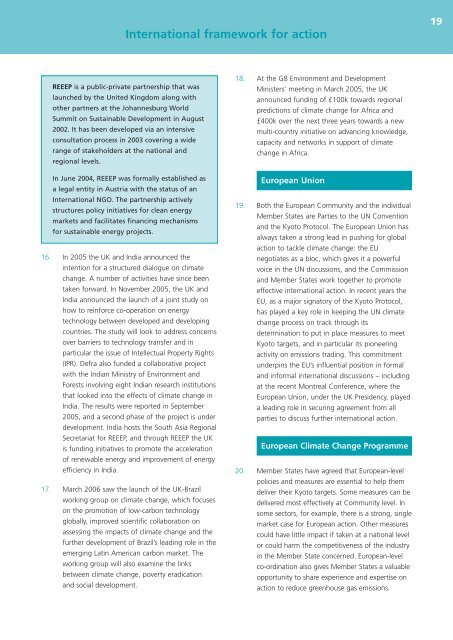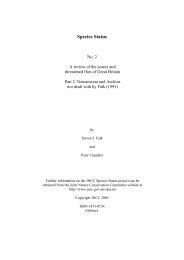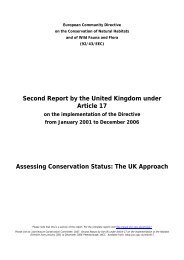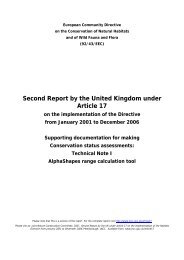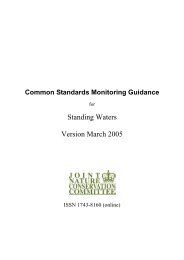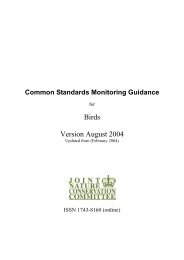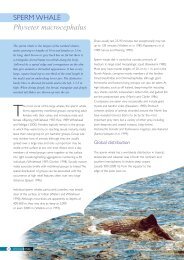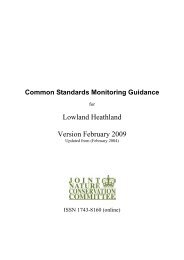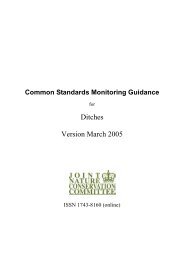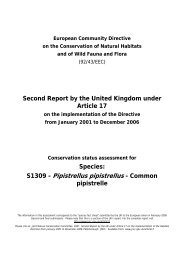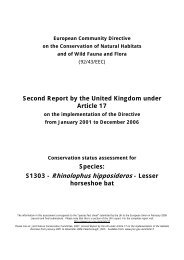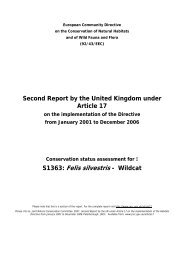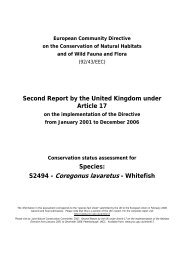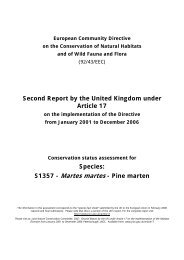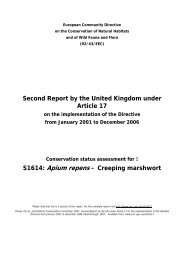UK Climate Change Programme 2006 - JNCC - Defra
UK Climate Change Programme 2006 - JNCC - Defra
UK Climate Change Programme 2006 - JNCC - Defra
Create successful ePaper yourself
Turn your PDF publications into a flip-book with our unique Google optimized e-Paper software.
International framework for action<br />
19<br />
REEEP is a public-private partnership that was<br />
launched by the United Kingdom along with<br />
other partners at the Johannesburg World<br />
Summit on Sustainable Development in August<br />
2002. It has been developed via an intensive<br />
consultation process in 2003 covering a wide<br />
range of stakeholders at the national and<br />
regional levels.<br />
In June 2004, REEEP was formally established as<br />
a legal entity in Austria with the status of an<br />
International NGO. The partnership actively<br />
structures policy initiatives for clean energy<br />
markets and facilitates financing mechanisms<br />
for sustainable energy projects.<br />
16. In 2005 the <strong>UK</strong> and India announced the<br />
intention for a structured dialogue on climate<br />
change. A number of activities have since been<br />
taken forward. In November 2005, the <strong>UK</strong> and<br />
India announced the launch of a joint study on<br />
how to reinforce co-operation on energy<br />
technology between developed and developing<br />
countries. The study will look to address concerns<br />
over barriers to technology transfer and in<br />
particular the issue of Intellectual Property Rights<br />
(IPR). <strong>Defra</strong> also funded a collaborative project<br />
with the Indian Ministry of Environment and<br />
Forests involving eight Indian research institutions<br />
that looked into the effects of climate change in<br />
India. The results were reported in September<br />
2005, and a second phase of the project is under<br />
development. India hosts the South Asia Regional<br />
Secretariat for REEEP, and through REEEP the <strong>UK</strong><br />
is funding initiatives to promote the acceleration<br />
of renewable energy and improvement of energy<br />
efficiency in India.<br />
17. March <strong>2006</strong> saw the launch of the <strong>UK</strong>-Brazil<br />
working group on climate change, which focuses<br />
on the promotion of low-carbon technology<br />
globally, improved scientific collaboration on<br />
assessing the impacts of climate change and the<br />
further development of Brazil’s leading role in the<br />
emerging Latin American carbon market. The<br />
working group will also examine the links<br />
between climate change, poverty eradication<br />
and social development.<br />
18. At the G8 Environment and Development<br />
Ministers’ meeting in March 2005, the <strong>UK</strong><br />
announced funding of £100k towards regional<br />
predictions of climate change for Africa and<br />
£400k over the next three years towards a new<br />
multi-country initiative on advancing knowledge,<br />
capacity and networks in support of climate<br />
change in Africa.<br />
European Union<br />
19. Both the European Community and the individual<br />
Member States are Parties to the UN Convention<br />
and the Kyoto Protocol. The European Union has<br />
always taken a strong lead in pushing for global<br />
action to tackle climate change: the EU<br />
negotiates as a bloc, which gives it a powerful<br />
voice in the UN discussions, and the Commission<br />
and Member States work together to promote<br />
effective international action. In recent years the<br />
EU, as a major signatory of the Kyoto Protocol,<br />
has played a key role in keeping the UN climate<br />
change process on track through its<br />
determination to put in place measures to meet<br />
Kyoto targets, and in particular its pioneering<br />
activity on emissions trading. This commitment<br />
underpins the EU’s influential position in formal<br />
and informal international discussions – including<br />
at the recent Montreal Conference, where the<br />
European Union, under the <strong>UK</strong> Presidency, played<br />
a leading role in securing agreement from all<br />
parties to discuss further international action.<br />
European <strong>Climate</strong> <strong>Change</strong> <strong>Programme</strong><br />
20. Member States have agreed that European-level<br />
policies and measures are essential to help them<br />
deliver their Kyoto targets. Some measures can be<br />
delivered most effectively at Community level. In<br />
some sectors, for example, there is a strong, single<br />
market case for European action. Other measures<br />
could have little impact if taken at a national level<br />
or could harm the competitiveness of the industry<br />
in the Member State concerned. European-level<br />
co-ordination also gives Member States a valuable<br />
opportunity to share experience and expertise on<br />
action to reduce greenhouse gas emissions.


